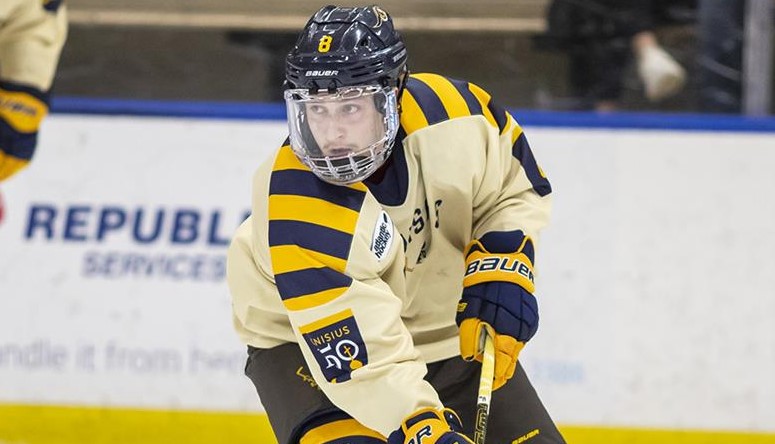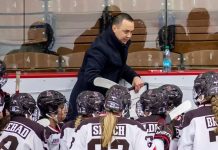
The frenetic pace in college hockey is, in some ways, building one of the strangest and most enthralling years for fans, analysts and observers.
The chaotic nature and arbitrary scheduling drop pucks virtually every night, and those willing to embrace the unknown are losing themselves in moments that likely won’t happen ever again. The lack of structure is creating new narratives, and the discussion is as interesting as anything in any sport.
Canisius was one of those teams taking part in the chaos.
Relegated to a program pause due to COVID-19, coach Trevor Large had the rare month away from the arena in December before his team retook the ice. He watched the games, as did his players, but they had to wait out the storm from their campus in Buffalo, N.Y.
Their participation didn’t occur until this past weekend when the Golden Griffins retook the ice and swept Mercyhurst for six hard-earned points that went beyond the action on the ice and dove into the spirit of the team’s soul.
“I said it to coaches are Canisius and other sports,” Large said. “I would say it to every coach that’s out there, youth to high school and beyond. All of us love to coach. We love being around our team, practicing and playing games and going out to compete – we live for those things. When you’re out there and you’re on the bench with the team, it’s a great feeling to be out there and compete at this level.”
Savoring the moment could only last so long, though, and for Large, it probably only lasted 31 seconds. That’s how long it took for Mercyhurst to turn a defensive zone stop into a neutral zone rush that culminated with Carson Briere’s faceoff circle feed to Steven Ipri, who moved around goalie Matt Ladd and wrapped a chance past the netminder for a 1-0 lead after a grand total of less than a minute.
That lead remained intact until the third period when the Griffins tied the game behind Lee Lapid’s first goal of the season. Keaton Mastrodonato and Mitchell Martan scored consecutive goals within four minutes later in the third to stake the team to a 3-1 lead, and it was fitting that Ipri’s last goal in a one-goal game came as a harmless, extra-attacker goal with four seconds on the clock.
“You start the game, and I think that’s how all of us felt, and then Mercyhurst comes down and makes a really nice play and ends up scoring,” Large said slyly. “It was like, ‘Okay, we don’t play to play. We play to win.’ I think, at the same time, that gave us a really good focus on the rest of the game. We were down, 1-0, going into the third period, but the messaging stayed the same. We didn’t play to play, we played to win.”
It set a fuse for the next night’s game at Mercyhurst that exploded when Ladd made 15 saves in a first period shutout. Mastrodonato scored in return to give Canisius a 1-0 lead, but the team slammed the door on the Lakers with a power play goal in the second period. An empty netter sealed a 3-0 win and a six-point weekend, and it vaulted the Griffins, who hadn’t played in 36 days, into third place with a .750 points percentage.
“I don’t know if all hockey clichés are necessarily true, but the fact is that (the second game is) another game,” Large said. “It’s another game where you want to have to win. That’s what we were playing for, that clear focus of what’s in front of us. Mercyhurst came out really aggressive. I heard (Mercyhurst coach) Rick (Gotkin) say they wanted to play mad, and they came out and listened.
“They were coachable. They played hard and mad and had that element of desperation. It took us 10 minutes to rebuttal that, to have our own energy and desperation. Maybe we weren’t playing our best, but we were up. The second period was similar. There were lots of penalties, but we ended up with a power play goal. The same message came on the road – we don’t play to play, we play to win. I loved how we played in the third period, which is a great sign for our culture and our team.”
It was a watershed moment for a program overlooked during a big week in Atlantic Hockey. Robert Morris returned to the national rankings and joined American International in this week’s poll as the No. 20 and No. 19 team, respectively, and the Golden Griffins, at 3-1 overall, didn’t even garner a vote.
Yet it’s Canisius with momentum after sitting in neutral for a month, and a team predicted in the preseason to finish near the bottom of the league is starting the second half stretch run with its voice loudly heard.
“It’s new for college coaches across the country,” Large said. “We’re now in what I would call a ‘pro hockey schedule.’ We’re not used to playing this many games in these many days. You just stay strategic. I’m not going to get too far in with what our strategy is, but it’s very detailed in how we’re going to prepare our guys for whatever day of the week is whatever opponent, that we stay fresh and ready.
“That’s our biggest focus. We’re going to play an opponent three times in a row, but I’m definitely not looking at game three against RIT. We are all focused on game one. That’s where our mindset is and we’ll be prepared for it.”
I took a wrong turn at Albu-qoi-kee
The COVID-19 impact on the 2020-21 season took a turn into the surreal this week when a number of postponements forced teams into unprecedented and unexpected action to schedule games for conference points.
It started last weekend when Bentley postponed its non-conference series against LIU because of a positive coronavirus test result. Losing the games cost the Falcons their only non-conference games for the time being, but the shutdown meant the Sharks wouldn’t play their first home game at the Northwell Health Ice Center at Eisenhower Park.
But wait, there’s more.
A positive test result forced the postponement of the Holy Cross-AIC series, but the Yellow Jackets essentially called LIU for a “we got next” situation over the weekend. It generated a highly-anticipated matchup out of thin air and paid dividends to the tune of a one-goal, 2-1 AIC win. That laid the foundation for Sunday’s return matchup on Long Island.
But wait, there’s more.
AIC revamped its schedule over the weekend to reschedule games against Army West Point this week with the first game dropping the puck on the base on Wednesday night. The teams moved a second game to Thursday night before scheduling a third game on Sunday at MassMutual Center. The AIC-LIU game in New York, at that point, was canceled.
But wait, there’s more.
Bentley paused its program on Tuesday and postponed its upcoming weekend series against Sacred Heart. The Pioneers were scheduled to play Army West Point this past weekend before it, too, was postponed. That meant Sacred Heart, which had not played a competitive game since December 15 and only completed two conference games against Holy Cross in early December, could play a quick one-off against LIU over the weekend. That break included the postponement of two games against Air Force originally scheduled in December for Colorado Springs.
But wait, there’s more.
Air Force remained out east after its series against Niagara in anticipation of its series next weekend against Mercyhurst. The break and geographic positioning of the Falcons enabled the Pioneers to reschedule one of those lost games – at Niagara’s Dwyer Arena, one day before the Purple Eagles play the first of three games against Robert Morris.
But wait, there’s more.
Those postponed Sacred Heart games against Army West Point? The schools agreed to play each other on three consecutive days in early February with two games in Connecticut, three days after the Black Knights’ fourth game against AIC.
That’s all. I think. Maybe. My head hurts.
Double, double your refreshment
In this week’s edition of TMQ, I spoke about the NCAA Tournament with my colleague and friend Paula Weston. I offered my thoughts about the possible criteria for the tournament and tried to balance understandable metrics and analytics against the emotional and subjective eye test.
My perspective is unique compared to the Big Ten or Hockey East or NCHC because Atlantic Hockey scraps against those leagues on an annual basis. I constantly reference the league’s fight for respect and occasionally – gasp! – lose my objectivity in order to stump for this league. I know it’s an uphill grind, but hey, I love this league and the hockey I get to watch on a weekly basis.
I figure this space is a good opportunity to reflect on what’s ahead for this league at a granular level. I specifically look at what happened in football when the lack of Big Ten and Pac-12 schools in the national polls opened the door for schools like Army and others to earn national rankings. More specifically, I point at Louisiana because the Ragin’ Cajuns (still one of the best names in sports) earned a national ranking for the first time in decades and finished the season in the College Football Playoff poll.
Atlantic Hockey is similar to that dynamic because losing certain teams that assuredly would be ranked opened daylight for league teams to jump into the fray. This week, AIC and Robert Morris produced the first poll with two AHA teams since I could remember. The teams were approximately 20 points clear of Michigan Tech, and a third team, RIT, received five votes against the rest of the nation.
AIC and Canisius are part of a five-way tie for the fifth-best winning percentage in the nation, and RMU is 10th, essentially one spot behind the two teams. Holy Cross and RIT are likewise in the top half with .500 or better records, and there are no winless programs. While it’s true that there haven’t been many non-conference games, save for the ones against LIU or the ECAC schools, there are two winless teams in both the WCHA and Hockey East with an additional one-win team in Hockey East.
Those leagues unquestionably skew a little bit towards their top-flight teams, most of which are national championship contenders. My bigger point is that the parity within Atlantic Hockey ensures some teams are rising, but nobody is really falling. That should draw more national attention.
It has to this point, but it’s a running storyline, one I’m happy to debate from my soapbox as March’s national tournament waters draw murkier into the conversation.


